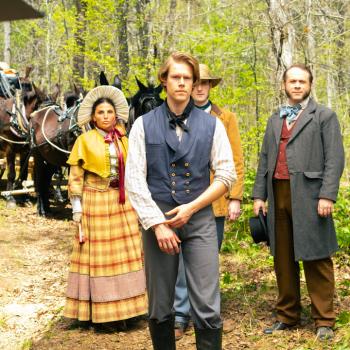
My wife and I have just returned from a performance in the de Jong Concert Hall at BYU by the violinist Joshua Bell, who was accompanied by Alessio Bax on the piano.
You may recall Joshua Bell from the famous “Washington Post Subway Experiment”:
He played Felix Mendelssohn’s Sonata for Violin and Piano in F Major (1838), followed by Edvard Grieg’s Sonata No. 3 in C Minor for Violin and Piano, Op. 45.
After an intermission, he performed the Sonata No. 1 for Violin and Piano in G major, Op. 78, by Johannes Brahms (1833-1897), and then followed that up with three relatively short crowd-pleasers that he announced from the stage: Brahms’s Hungarian Dance No. 1; the “Méditation” from the opera Thaïs by Jules Massenet; and the 1878 Zigeunerweisen, by Pablo de Sarasate.
Now for my point:
The program notes (written by Luke Howard) reminded me very strongly of the Deseret News column that I published earlier today: “Why faith matters so very, very much.” I’ll quote the relevant passages from the notes:
“The remarkable genius of Felix Mendelssohn’s youth is well-documented. While still an adolescent, he had reached maturity as a composer and was a prodigy on both piano and violin. In his teens he was reportedly an exceptional athlete and swimmer, a talented poet who had won the praise and friendship of Goethe, spoke multiple languages fluently, and was an unusually gifted watercolorist and philosopher. As Julian Haylock writes, ‘He excelled at virtually anything that could hold his attention for long enough.'”
Yet “Mendelssohn chose a career in music, knowing that he could have succeeded brilliantly in almost any other field.” And he succeeded brilliantly in music.
But he died in 1847 at the tragically young age of 38.
So much talent lost. So much potential unrealized on this earth.
According to Peter Mercer-Taylor, The Life of Mendelssohn (Cambridge: Cambridge University Press, 2000), 206, Mendelssohn had, in a letter, once described death as a place “where it is to be hoped there is still music, but no more sorrow or partings.”
Indeed.
Johannes Brahms (1833-1897) and Edvard Grieg (1843-1907) led considerably longer lives, though neither of them survived to a very advanced age. Grieg died at the age of 64. Brahms died at 63.
And there’s a specific aspect of Grieg’s life that powerfully reminded me of a quotation from the philosopher William James that I included in today’s column. Here’s another passage from the program notes:
Grieg “was dissatisfied with his compositions that were most closely associated with Norwegian culture, in particular his incidental music for Sigurd Jorsalfar and Peer Gynt, labelling them ‘trashy occasional pieces.’ Grieg continually felt the need to write a substantial, ‘respectable’ work that would prove (if only to himself) his musical maturity, self-discipline, and mastery of materials: the hallmarks of a conservatory education. But by the end of his career he had completed only a handful of full-length compositions: an early piano sonata, an unpublished symphony, the famous Piano Concerto, a cello sonata, a string quartet, and three violin sonatas.”
In other words, he died deeply unsatisfied.
For further thoughts along these lines, see a column that I published back in 2012 (and that was, frankly, seriously mistitled):
“Beethoven is a study in hope, healing”
Incidentally — and on a cheerier note — Edvard Grieg made his home famous in his wonderful piece “Wedding Day at Troldhaugen,” written for his wife on the occasion of their twenty-fifth anniversary.















